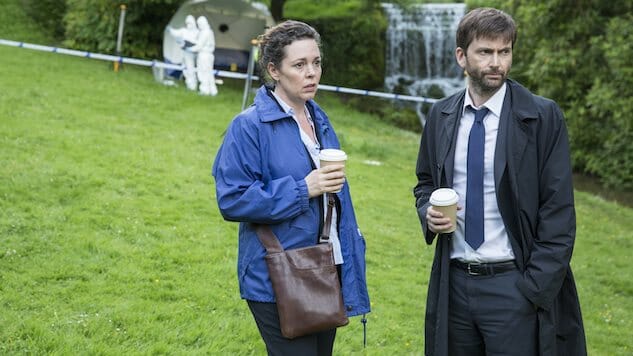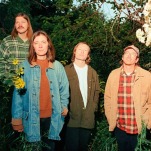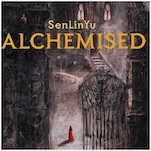Broadchurch‘s Chris Chibnall on the Final Season and Leaving Viewers Wanting More
Photo: Colin Hutton/BBC America
For those of us obsessed with Broadchurch, the worldwide hit created by Chris Chibnall, Season Three will feel more like Season One. D.I. Alec Hardy (David Tennant) and D.S. Ellie Miller (Olivia Colman) are back together three years later, working on a single case for the season: Hardy and Miller are called in after Trish Winterman (Julie Hesmondhalgh) is raped at her friend Cath Atwood’s (Sarah Parish) 50th birthday party.
This is the final season of Broadchurch. Ever. Or, is there a sliver of hope that Chibnall might change his mind, after his new gig as showrunner of the beloved Dr. Who? We asked the creator himself, and discuss other details of his brainchild in its last season. [Ed. note: This interview has been lightly edited for length and clarity,]
Paste: Many American viewers were introduced to Broadchurch through Gracepoint. How did you feel about Gracepoint’s poor critical reception and ratings?
Chris Chibnall: It was an adventure. We just had a laugh with it. It was always a thing whereby Broadchurch was such a massive hit in the U.K. and around the world… We have one remake in America with Fox, we had another remake in France called Malaterra, and all of these things are just all part of this incredible ride the show has taken me on, and has taken all the people involved on, across the last few years. It was just one adventure after another. It’s like, you do anything, you have an experience. You have an experience doing it. That was an amazing cast on [Gracepoint] there were some great showrunners. You never know whether anything will be a success or not, so it’s been the most amazing ride. I wouldn’t swap a second of it for anything else.
Paste: You probably didn’t predict Broadchurch would become such a hit, with people like me watching till 5 a.m. because we had to see the next episode. I love Colman and Tennant as Miller and Hardy. Besides good writing, is that what makes such a successful show?
Chibnall: Everybody loves great actors. I got really lucky having David Tennant and Olivia Colman and being able to watch that partnership blossom and grow and spark. One of the main points of the show’s success has been that chemistry between them, the humor they bring, the warmth they bring. They’re both really, really wonderful human beings, as well as wonderful actors and that bleeds off screen clearly. The whole ensemble on Broadchurch, every actor we’ve had come through the show has been extraordinary, and David and Olivia have set the standard and led from the front all the way. My great sadness in not having more stories in this world is, “Ah, okay, well those two characters, I’m not going to be writing for them anymore.”
Paste: When you created Broadchurch, did you see it as a trilogy?
Chibnall: I didn’t. The first season was a self-contained story. At the back of my mind, I thought, “If we had any tiny amount of success, then maybe we could see the trial.” I thought maybe there were two more stories in it, so I feel very privileged and lucky that we got to tell those other two stories. But I don’t have any other stories in that world. As you know from watching the show, it’s a small community, there’s only a certain amount of crime that you would find there, and I think the emotional credibility of the show is really important.
Paste: Your ambition wasn’t to have a finale, right? I loved how it ended. It could keep going. The characters are still out there.
Chibnall: Not to spoil it too much, but absolutely. The ending is really to say this case is over, but they go on another day and we’re just going to move away from their lives. Somewhere out there they’re on that coast road, still arguing in that car.
Paste: Some fans didn’t like Season Two. For me, it was just different. Season Three felt more like Season One. Was that intentional?
Chibnall: Yeah. It was because of the subject matter. Season Two was a very deliberate attempt to try something different, and obviously that can be polarizing with a show. What I’ve always wanted to do is follow through the emotional lives of the characters, and obviously the Latimers, Mark [played by Andrew Buchan] is still there in Season Three as well. Once I knew that we would be dealing with a sexual assault case, the more investigative framework of Season One absolutely came back into play a lot more.
Paste: Did you choose sexual assault as the crime focused on Season Three because a small town can’t have another murder? How did you come to that topic as the storyline?
Chibnall: There were two reasons. I knew I would never do another murder within Broadchurch because the whole impact of Season One was how rare this crime is there. And the reason for choosing sexual assault was, there’s been a massive upturn in the reporting of sexual assaults in the U.K. It’s become a national talking point and issue in the last few years and I wanted to dig into that and talk about that as an issue, as well as things like the sexualization of society and children, and access to porn and what that’s doing to everyone.
Paste: Was the look for Trish Winterman specific for the role?
Chibnall: The choice of character and the age of the character and the profile of the character was very deliberate. The whole [season] was borne out of a number of months of research with sexual violence advisers, specialist detectives here in the U.K., and what we wanted to do is debunk the myths and the tropes—for example, the girl in the short skirt in [her] mid-20s going down a dark alley. People who work in the support services said there’s a whole swath of stories that aren’t being told. All of this came out of research. The point of the story is that rape is not about sex. It’s about power and it’s about control.
Paste: I always go back and fast forward to Miller and Hardy scenes. Did you feel there wasn’t much space this season to open up their lives more this season?
Chibnall: My goal is always to leave you slightly wanting more [laughs]. I think those actors are wonderful and the moment when you know everything about a character is when you possibly stop wanting to spend time with them. I very much love them and they haven’t told me everything about themselves, so I’ve told you pretty much everything I know. I would love to spend more time with them, too. They just won’t let me.
Paste: I read somewhere that you said you kind of regretted the decision to make this the final season. Does that mean there’s a glimmer of hope for fans that you could change your mind one day, or are we never going to see them again?
Chibnall: The honest answer to that is, I don’t know. I have another job I’m going to, so there’s nothing in the short- or medium-term future. I was slightly joking, but I love those characters, I love writing those characters, I love working with those actors, I love writing for those actors. I’m very sad I don’t get to do it again in the next season, but I didn’t have a story and I didn’t want the show to keep going just for the sake of it. What’s great is, I feel like we’ve had the best of them, and so, who knows what the future holds, but I don’t have anything, I have no news for you on that. Nothing in the future—so far [laughs].
Paste: What will you miss about the show? Or is there not enough time since it ended?
Chibnall: Not yet. I guess I may do in a year or two. I live near that beach and I will miss filming in my hometown. I will miss the support of the people down there. That’s been amazing. And actually I’ll miss all those amazing actors coming down every summer and spending time there, and I think they will all miss that, too.
Paste: When you started the show, did you have David Tennant and Olivia Colman in mind for the characters?
Chibnall: I slightly had Olivia at the back of my mind, but then forgot and our brilliant executive producer Jane Featherstone said, “Oh, we should try and get Olivia Colman for this!” And I said, “Oh, wait, hang on!” And David, I’d worked with a couple of times previously and he was so magnificent, it was like every time I wrote a part, I felt like I was saying, “We should ask David Tennant!” [laughs] But he was just irresistible and brought so much humor and warmth. That character is angry, repressed, and yet David gives it this warmth and humor and beauty. It’s really great.
Paste: That’s my favorite character in all of television, even trumping Downton, I think.
Chris Chibnall: Oh, come on.
Paste: Really. That’s why I wanted to interview you. I couldn’t watch other shows when the lead is too good-looking and there aren’t enough flaws, and that gravitas. David brings something deeper to this character.
Chibnall: David’s one of the greatest actors of his generation, he can go from Hamlet to Dr. Who to this, and really that’s the sign of a truly versatile actor. He’s definitive in all those parts. I think he’s brilliant. He’s currently playing Don Juan in Soho in the West End, which again gives you a clue to his range and his versatility. Honestly, I could talk to you for seven hours and not run out of great things to say about David Tennant.
Paste: Did you have a certain intention for Miller and Hardy and their relationship or their storylines in the final season?
Chibnall: What I wanted to show was how they’ve moved on from [Seasons] One and Two—that in very subtle ways, they’re very different, in that Ellie is much tougher, if you compare her to how we come into Season One, episode one, and Hardy is slightly softer. That’s what I wanted to show very, very delicately for people like yourself who really have spent time with the characters, how that partnership has changed them and how they’ve both gone in new directions. I also wanted to explore the fact that they were both single parents now as well. They’re both having to look after children on their own, and really to chart the subtle journey of where they end up at the end of this season compared to where they started together at the beginning of Season One.
Season Three of Broadchurch premieres Wednesday, June 28 at 10 p.m. on BBC America.







































